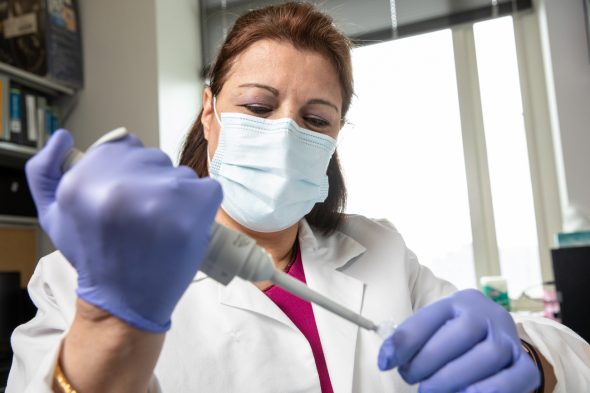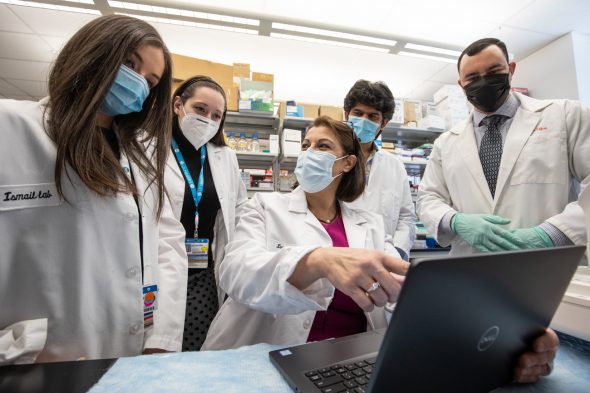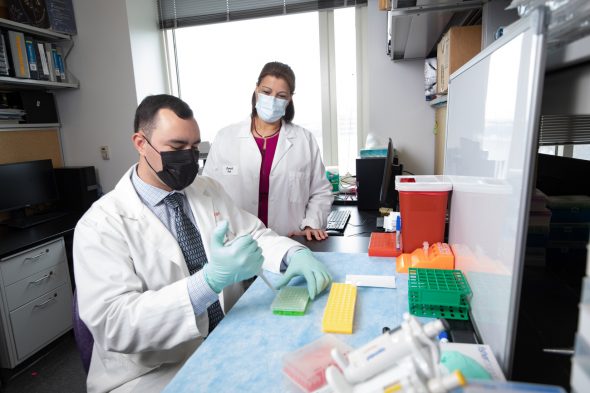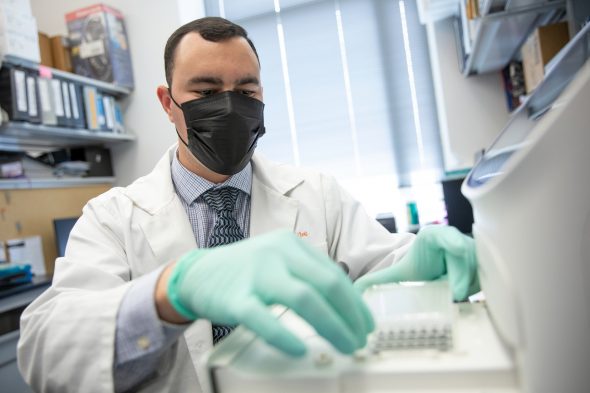Next-generation sequencing of community-based COVID-19 samples to detect emerging variants

Researchers at the University of Illinois Chicago are offering free rapid diagnostic testing for COVID-19 in vulnerable Chicago communities and performing genomic sequencing on the samples to identify variants. The research is part of a National Institutes of Health-funded initiative called Rapid Acceleration of Diagnostics Underserved Populations, or RADx-UP.
The UIC researchers are working to engage 7,000 Chicagoans in testing through self-collected nasal swabs, which can be taken at home or in-person at UI Health Mile Square Health Center and can be mailed to UIC or dropped off in person at Mile Square. Participants are notified of positive or negative COVID-19 results and a contact tracing team provides guidance, education, and resources.
“But we don’t stop there,” said Dr. Nahed Ismail, UIC professor of pathology at the College of Medicine and principal investigator. “We also use genomic sequencing to further analyze all COVID-19 positive samples, which helps us gather needed information on variants and the circulating strains of COVID-19 impacting Chicago communities.”
The samples are de-identified before sequencing and the results of the analysis are used only for public health surveillance and research purposes. The UIC team hopes the research will help scientists, doctors, and public health officials better understand how the human immune system responds to COVID-19 and its various strains, which develop from genetic mutations that makes the virus more fit to survive.
“In addition to its goals of increasing testing uptake and addressing testing barriers, the study will leverage community-engaged research to understand viral dynamics, transmission, and evolution of the virus in Chicago-area Black and Latino communities,” said Ismail, who is also medical director of clinical microbiology and laboratory medicine at the UIC College of Medicine.

The variants are identified by next-generation sequencing, or NGS, a technology through which millions and billions of DNA strands containing genetic information can be read and understood. With NGS, the UIC researchers sequence the entire genome of SARS-COV-2 viral mRNA. In this process, the virus RNA molecules in positive nasal swab samples are turned into DNA and sequencing is used to track the evolution of the virus and detect new variant strains.
“This will tell us if the known circulating variant strains — the B1.1.7 strain first identified in the U.K. or the B.1.351 strain first identified in South Africa, for example — start spreading in our communities,” Ismail said. “Understanding how the virus has changed over time can help us develop new vaccines or therapeutics for COVID-19 as well as prevent the spread of the virus globally.
“Combining early intervention via rapid diagnosis of COVID-19 and contact tracing with genome surveillance efforts to detect variant strains will significantly reduce COVID-19 transmission, morbidity, and mortality,” Ismail said. “SARS-CoV-2 is not the first virulent pathogen to leave its mark on human history and it certainly will not be the last. The infrastructure we build today not only helps us prepare to mitigate vaccine breakthrough and emerging variants of COVID-19 by tracking transmission, genetic signatures, and immune responses in the short term, it also helps us prepare for whatever might come after COVID-19, be it a new coronavirus, a new flu, or something entirely different. A new outbreak is inevitable, but hopefully, another year like 2020 can be prevented.”
The RADx-UP team also includes co-principal investigator Renee Taylor and co-investigators Karriem Watson, Ian Jasenof, and Sanjib Basu of UIC. Dr. Ayman Al Hendy at the University of Chicago is also a co-principal investigator. The research is supported by a $2 million award (3R01ES02861506S1) from the National Institutes of Health.
Additional Photos

Dr. Nahed Ismail assists research specialist Amr Elfert in the lab. 
Dr. Nahed Ismail. 
Research specialist Amr Elfert loads nasopharyngeal samples into a QuantStudio 3 RT-PCR machine.
How to participate
Anyone interested in participating in this research through COVID-19 testing can contact CovidTestingChoices@uic.edu for more information.
Categories
Coronavirus, Health Sciences Colleges, Research
Topics
COVID-19, COVID-19 testing, genomic sequencing, next generation sequencing
